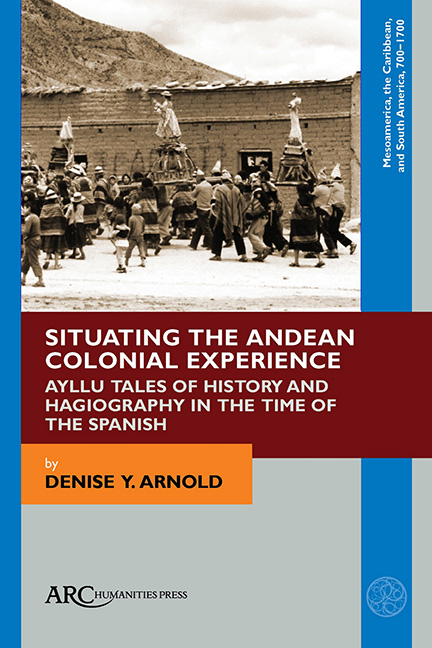 Situating the Andean Colonial Experience
Situating the Andean Colonial Experience Book contents
- Frontmatter
- Contents
- List of Illustrations
- Note About the Spelling of Toponyms and Proper Names
- Acknowledgements
- Maps
- Introduction
- PART ONE THE ORAL HISTORY OF QAQACHAKA
- PART TWO THE COLONIAL CACIQUES IN ORAL AND WRITTEN HISTORY
- PART THREE QAQACHAKA MARKA
- PART FOUR THE SAINTS APPEAR
- PART FIVE THE RELIGIOUS PRACTICES OF QAQACHAKA MARKA
- Some Conclusions
- Glossary
- Appendix A Document C of Don Franco Quispe Maraza
- Appendix B Document K of Don Franco Quispe Maraza
- Bibliography
- Thematic Index
- Index of Toponyms
Chapter 14 - Converting the Saints into Persons
Published online by Cambridge University Press: 22 June 2021
- Frontmatter
- Contents
- List of Illustrations
- Note About the Spelling of Toponyms and Proper Names
- Acknowledgements
- Maps
- Introduction
- PART ONE THE ORAL HISTORY OF QAQACHAKA
- PART TWO THE COLONIAL CACIQUES IN ORAL AND WRITTEN HISTORY
- PART THREE QAQACHAKA MARKA
- PART FOUR THE SAINTS APPEAR
- PART FIVE THE RELIGIOUS PRACTICES OF QAQACHAKA MARKA
- Some Conclusions
- Glossary
- Appendix A Document C of Don Franco Quispe Maraza
- Appendix B Document K of Don Franco Quispe Maraza
- Bibliography
- Thematic Index
- Index of Toponyms
Summary
You wrap him in a bundle. It's as if we were wrapping a stone, all rounded off so, until it becomes transformed into something rounded …
Don Enrique Espejo, from Qaqachaka puebloRETURNING TO SOME of the main themes of this book, I shall now flesh out two ontological notions that have become evident in the treatment of the god-saints of Qaqachaka annex, and their counterparts in rites to the guardian mountains and the earth: that of “making a person,” in Aymara jaqichaña, and that of “rearing mutually,” in Aymara uywasiña, which I have already commented on in part.
Many studies of the Andes have already demonstrated that the actions of dressing someone and giving them food are two key activities in forming “persons” (jaqi), which usually imply cohabiting with them, and through this, making them kin members of your group. Krista Van Vleet (2008) reiterates the same idea: that it is not sufficient to give birth to offspring; you must care for them and sustain them constantly. In the recent paradigm changes in the Social Sciences and Humanities, these practices have often been situated within the “relational ontologies” that characterize many Amerindian pueblos in South America, including those from the Andes (De Munter 2016). In the first place, I have noted that the notion of “person” within these relational ontologies is ample, including humans, animals and plants, places and even some material elements of the world, such as textiles, mountains, and the figures of saints of a certain locality. So I have examined in this book many examples of practices in which “persons” are being made of humans, non-humans, and material things. In the second place, the human actions of dressing and feeding someone or something to convert them into a “person” transforms them from objects into subjects, accompanied by other changes in the manner of addressing them to incorporate them within the range of kin or affines, whether as mothers, fathers, sisters, sisters-in-law or children. This change in patterns of behaviour is particularly evident in the song contents we examined in the last chapter.
- Type
- Chapter
- Information
- Situating the Andean Colonial ExperienceAyllu Tales of History and Hagiography in the Time of the Spanish, pp. 295 - 322Publisher: Amsterdam University PressPrint publication year: 2021


